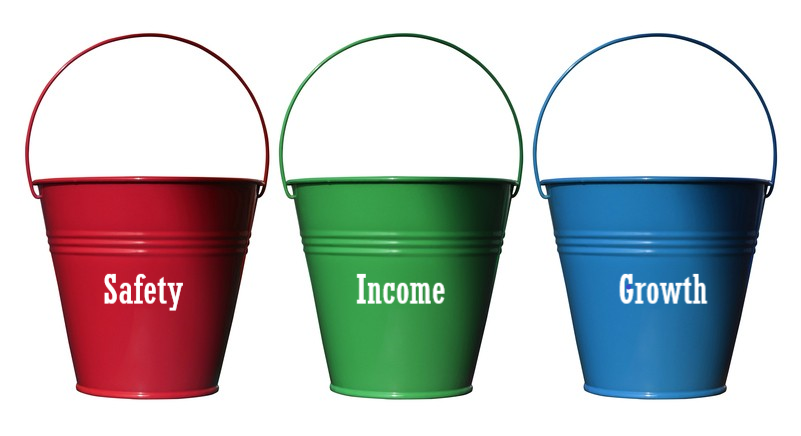Interest rates have increased dramatically since the start of 2022, in an effort to combat persistent high inflation. While this has been very challenging if you’re borrowing money to buy a home or expand your business, you can now get more than 4% for keeping money in a high yield savings account, some even approaching 5%.
If you have cash on the sidelines, this brings up a very logical question: Should I invest when cash is paying almost 5%?
Let’s first think about which investment “bucket” this money sits in: Safety, Income, Growth. As a reminder:
- Safety. This bucket is a six-to-twelve-month emergency reserve plus any planned significant spending in the next year, generally kept in cash to keep it safe.
- Income / Conservative Investments. This bucket sends your monthly paycheck in retirement or serves as a conservative investment portfolio before retirement, usually invested in a mix of stocks, bonds, and cash with a goal of growth with lower risk than your long-term funds.
- Growth. This bucket grows the funds you’ll need down the road for retirement has time to ride out the ups and downs of the market, generally invested.

If this money is intended for short-term use, your high yield savings account is likely the right spot. But if your cash reserve is fully stocked and you’re wondering whether you should keep extra cash in savings or invest in your long-term bucket, consider three points:
1. High interest rates aren’t forever.
In January 2022, the highest yielding savings accounts were paying around 0.70%. If the Federal Reserve starts cutting interest rates, we’ll see these high savings rates decline, as well.
2. When rates decrease, the stock market tends to jump.
The Federal Reserve raised rates at an historic pace in 2022, contributing to the S&P 500’s nearly 20% decline. Why? When interest rates are high, consumers and companies spend less because money is more expensive to borrow, growth slows, and stocks decline. The opposite also tends to be true: when rates decline, spending and growth tend to increase, companies earn more, and stocks increase. When the Federal Reserve begins cutting rates, you’re likely to see your savings interest decrease. But because the market tends to react to what it thinks is coming, you might already have missed a spike in the market.
3. Timing can be costly.
As we cover in Time in the Market Is Better Than Timing the Market, missing just a few of the best days in the stock market is devastating to your long-term results. From 2000 to 2019, missing the best 10 days – just 10 days in 20 years – would have cut your return in half. A good rule of thumb is to eliminate strategies that require you to guess and be right. Don’t try to guess what the market is about to do. Allocating to your buckets based on your plan is far more reliable.
So, what should you do with your cash? It all comes down to your plan.
First, decide how much cash you need in your Safety bucket and earn as much risk-free interest here as you can. High yield savings is great for these funds.
Next, invest the rest based on when you plan to spend the funds. If you’re investing money you won’t use for five or more years, focus on assets that grow over time. Whether this is your diversified stock portfolio, real estate, or another long-term investment, your financial plan should include a strategic investment plan you can stick to. We’ll see spikes in cash interest rates from time to time, but making short-term decisions with long-term money tends to hurt more than it helps.
Lastly, talk with your team! If you aren’t confident about what goal your money should be focused on, your financial advising team should be your go-to resource to brainstorm and come to an action plan you can confidently put in motion. If you’re looking for a team to help with this kind of planning, learn more about how we work!
The “Alterra” name was coined by joining the Latin roots “alter”, the origin of the word “altruism” with “terra” meaning earth or land. This name reflects the company philosophy of “clients before profits” and providing firmly grounded advice.


